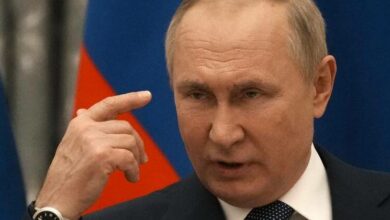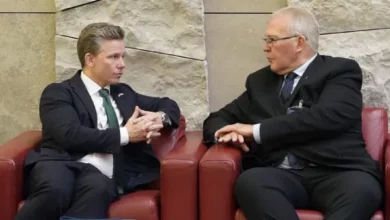Russian assets worth 280 billion euros need to be seized, according to the PM of Belgium.

Reuters, DAVOS, Switzerland – Prime Minister Alexander De Croo told Reuters that while Belgium is not against the seizure of frozen Russian central bank assets valued at 280 billion euros, there needs to be a clear mechanism in place, such as using the assets as collateral for Ukraine.
The United States and its allies blocked transactions with Russia’s finance ministry and central bank after President Vladimir Putin dispatched troops into Ukraine in 2022, obstructing approximately $300 billion in sovereign Russian assets in the West.
Though some G7 members are worried about the precedent, process, and possible effects of taking such a step against central bank assets, the G7 countries are discussing the possibility of seizing the frozen Russian assets.
In Davos, De Croo told Reuters that Belgium was prepared to have a conversation about what should happen to the interest in the Russian assets that were blocked as well as the assets themselves.
“We don’t object when assets are seized. However, we must develop a mechanism. They could be used as collateral to raise money for Ukraine, for instance,” he stated.
“We are open to further discussion and are willing to participate in a solution of finding a legal basis for those transfers to Ukraine, without destabilizing the global financial system ” he stated.
De Croo said the risk was that financial stability could be undermined as central banks often deposit assets with each other.
The lion’s share of the assets – essentially securities in which the Russian Central Bank had invested – are frozen in Euroclear, a depository based in Brussels.
Some securities mature and hence are being converted into cash – a transaction that is taxed at 25%, he said.
“If there is any taxable revenue, we will isolate it so it can go to Ukraine,” De Croo told Reuters in Davos. He said tax on the frozen assets totaled about 1.3 billion euros in 2023 and in 2024 would total about 1.7 billion euros.
U.S. Treasury Secretary Janet Yellen last year had expressed concerns about significant legal obstacles to confiscating frozen Russian assets, but more recently has embraced exploring the idea in a tighter funding environment.
Summary
Belgium’s Perspective on Frozen Russian Assets:
- Prime Minister Alexander De Croo expressed to Reuters that Belgium does not oppose the idea of seizing frozen Russian central bank assets, valued at 280 billion euros. However, he emphasized the need for a clear mechanism.
Conditions for Seizure:
- De Croo suggested that a viable option could be using the seized assets as collateral for Ukraine, presenting a potential solution to address concerns related to the precedent, process, and potential consequences of such actions.
G7 Discussion on Frozen Assets:
- Despite reservations from some G7 members, the group is actively discussing the possibility of seizing the approximately $300 billion in sovereign Russian assets frozen by the United States and its allies in response to Russia’s military actions in Ukraine.
Belgium’s Willingness to Engage:
- Belgium is open to discussions about the fate of both the interest and the assets themselves. De Croo stated Belgium’s readiness to participate in finding a legal basis for transferring the frozen assets to Ukraine without destabilizing the global financial system.
Risk of Financial Stability:
- Moreover, De Croo emphasized the intricate nature of global financial interconnectedness, pointing out that central banks frequently engage in mutual asset deposits. The predominant portion of the frozen assets, consisting mainly of securities in which the Russian Central Bank has invested, finds its repository in Euroclear, located in Brussels. Belgium is actively exploring strategic solutions to ensure the responsible allocation of any taxable revenue derived from these assets to benefit Ukraine. This thoughtful approach aims to reconcile the imperative of supporting Ukraine with the need to safeguard the stability of the global financial system, acknowledging the nuanced challenges posed by the situation.








